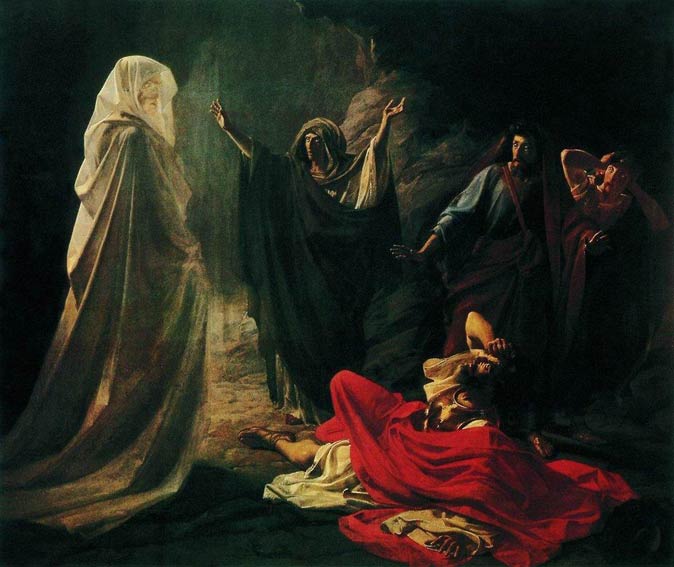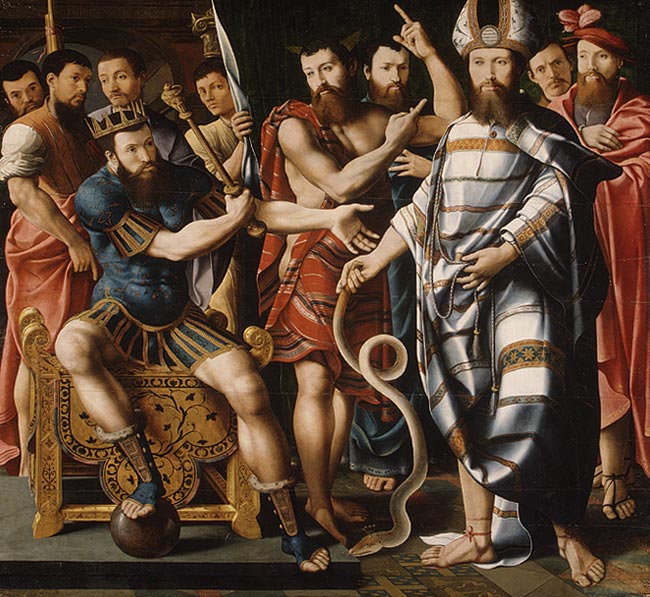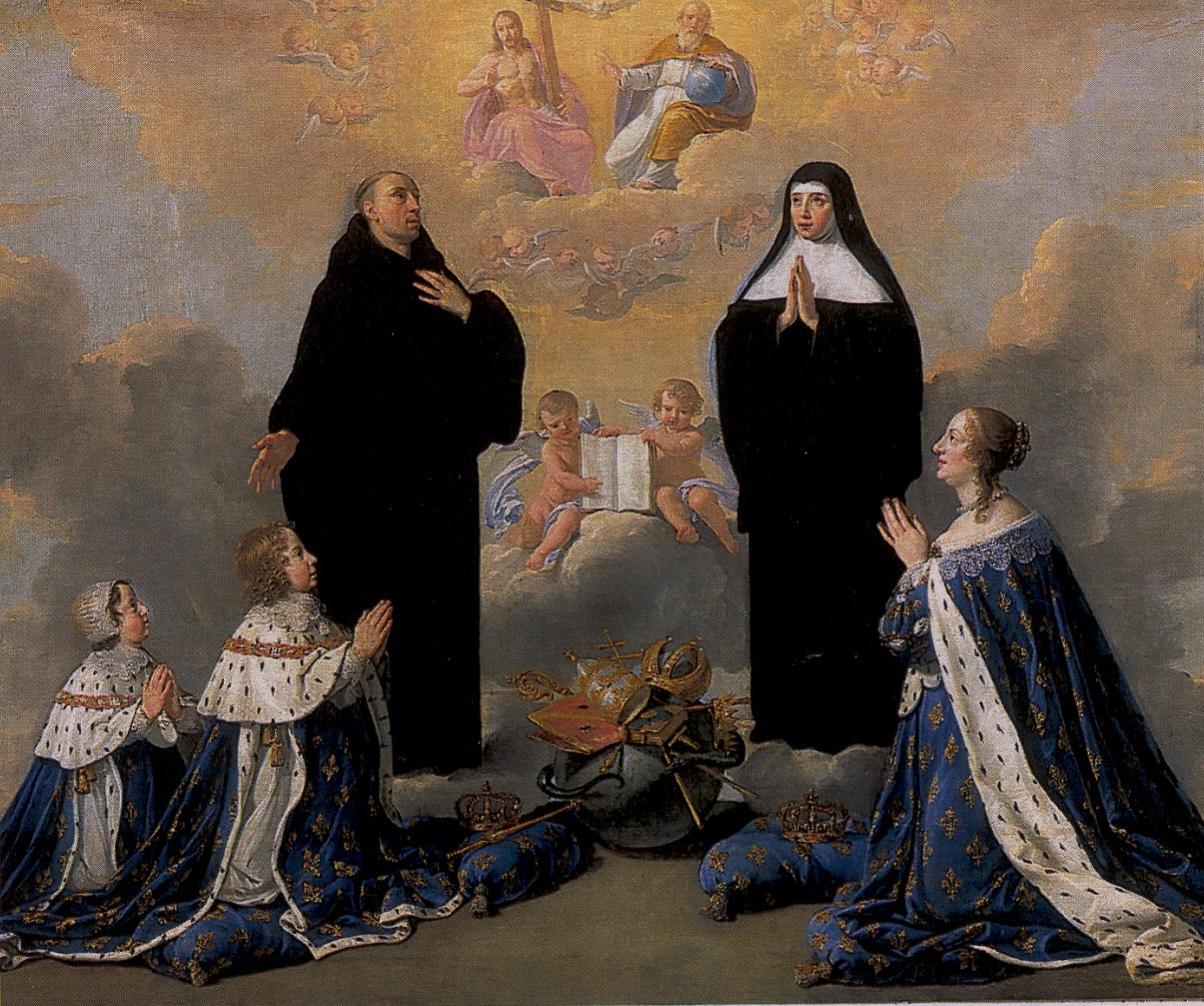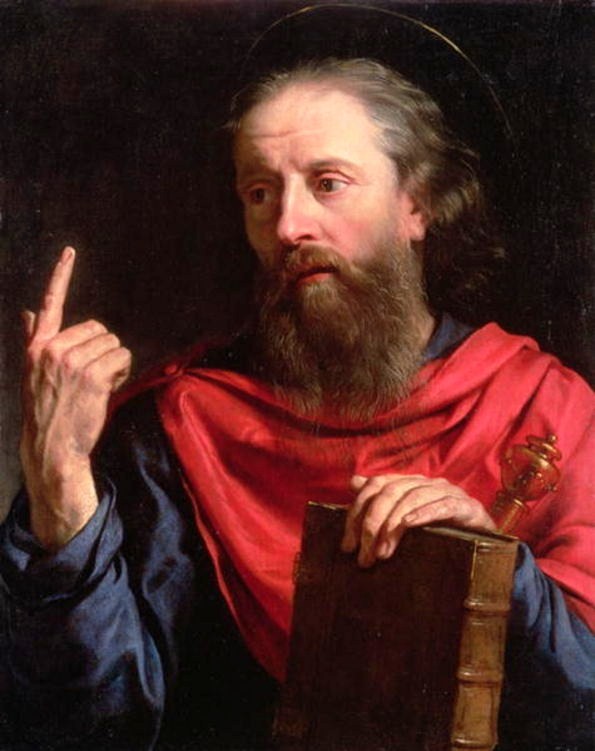 |
| Nikolay Ge, Witch of Endor (1857) |
The first of these objections is simple enough. The Old Testament prohibits divination, witchcraft and mediums (Deuteronomy 18:10). This is why King Saul was sinning when he visited the witch of Endor, and persuaded her to conjure up the spirit of the deceased prophet Samuel (1 Sam. 28).
But the difference between praying to the Saints and conjuring up the dead is exactly the same as the difference between magic and miracles. Magic is condemned in Scripture as well (Rev. 21:8), and precisely for this reason: it seeks to achieve the supernatural by working around God, or by trying to force His hand. J.K. Rowling, the author of Harry Potter, admitted as much in an interview with Oprah, saying, “I’m not saying I believe magic is real—I don’t. But that’s the perennial appeal of magic—the idea that we ourselves have power and we can shape our world.” That’s a good definition of magic, and also what makes the appeal of magic so dangerous. It’s Lucifer’s non serviam all over again: we’ve got magic, who needs God?
 |
| Moses and Aaron before Pharaoh: An Allegory of the Dinteville Family (1537) |
With miracles, you accomplish the exact same things, but going through God, rather than around Him. The clearest contrast is when Moses faces off with the Egyptian magicians in the Book of Exodus. When Moses and Aaron unleashed the ten plagues, the magicians would attempt to imitate it through magic — sometimes successfully (Exodus 7:10-12; 20-22; Ex. 8:6-7, 16-19; Ex. 9:10-11). My point is that the godly and the sinful thing may look similar, but they’re very different morally. Since miracles involve working through God, they’re tied to faith, and seeking God’s gifts. Since magic involves trying to work around Him, they’re tied to rebellion, and trying to steal God’s power. Even if the end result is the same, it makes a big difference whether we got there by seeking a gift or stealing.
Having said all that, I understand that to Protestant eyes, a Catholic praying to Mary probably looks a bit like Saul conjuring up Samuel. But with Catholic prayer, we’re going through God, not around Him. For example, the Rosary begins, “In the name of the Father, and of the Son, and of the Holy Spirit,” followed by the Apostle’s Creed, and the Our Father. The only way that the Saints can hear us is through the power of the Holy Spirit.
Even assuming the person you’re speaking to can accept the idea that going around God is sinful and going through God isn’t, you’re not quite home free yet. More than once, I’ve found myself explaining this, only to have the other person say something along the lines of, “So let me get this straight. When you pray a Hail Mary, you’re offering up prayer through God to Mary, asking Mary to pray to God for something. Why not just ask God yourself, directly?” The whole thing seems needlessly indirect.
 |
| Philippe de Champaigne, Anne of Austria and Her Children at Prayer with St. Benedict and St. Scholastica, (1646) |
One answer to this is simply that we think that the prayers of the Saints in glory are more efficacious than the prayers of those of us still mired in sin. Certainly, James 5:16 ties the effectiveness of prayer with the righteousness of the person praying it.
But perhaps the better answer is simply this: all prayer is indirect. The clearest example comes from Matthew 6:7-13, in which Jesus says,
And in praying do not heap up empty phrases as the Gentiles do; for they think that they will be heard for their many words. Do not be like them, for your Father knows what you need before you ask him. Pray then like this:
Our Father who art in heaven, Hallowed be thy name.
Thy kingdom come. Thy will be done, On earth as it is in heaven.
Give us this day our daily bread;
And forgive us our debts, As we also have forgiven our debtors;
And lead us not into temptation, But deliver us from evil.
 |
| Philippe de Champaigne, The Annunciation (1644) |
Or to take another example, think of all of the times that God communicates with man through angels. Does an omnipresent God need to send a messenger? Of course not. But He routinely does so in both the Old and New Testament.
Clearly, then, prayer isn’t simply about identifying the solutions to problems as efficiently as we can: God can do that just fine on His own. Rather, it’s a transformative process that helps to do at least two things: conform our wills with God’s, and draw us into closer union with one another. With that in mind, consider a few examples of prayer from Scripture:
Genesis 18:17-19:29. God tells Abraham that He plans to destroy the city of Sodom for its sinfulness. Abraham then intercedes on behalf of the city, essentially bartering with God until He agrees that if there are even ten righteous people in the entire city, He won’t destroy it. There aren’t, so Sodom gets destroyed, but as a blessing to Abraham, God saves his nephew Lot, along with Lot’s family. This is captured beautifully in Gen. 19:29, “So when God destroyed the cities of the plain, He remembered Abraham, and He brought Lot out of the catastrophe that overthrew the cities where Lot had lived.” So rather than God negotiating directly with Lot, He goes to Lot’s holier uncle, Abraham. Abraham’s intercession saves Lot.
Deuteronomy 9:16-21. When Israel, including the high priest Aaron, fall into idolatry, it’s through the intercession of Moses that they’re saved, after Moses fasted and prayed for forty days and forty nights.
 |
| Albrecht Dürer, Mary Praying (1518) |
1 Kings 2:13-25. When Adonijah has a big favor to ask of his brother, King Solomon, he accomplishes it by asking Solomon’s mother, Bathsheba, who then asks Solomon on his behalf. In this case, things don’t work out well for Adonijah (he’s asking for Abishag’s hand in marriage, and Solomon immediately realizes that he’s plotting a coup and has him killed). But it’s clear why he chooses such an indirect way. By going to the king’s mother, Bathsheba, the king is more likely to grant the request. Indeed, when Bathsheba enters the room, King Solomon honors her by rising from his throne and bowing to her, telling her that he’ll grant her whatever she asks (1 Kings 2:19-20). Christ is greater than Solomon (Mt. 12:42), but doesn’t love His Mother any less.
Luke 16:19-31. The parable of Lazarus and the rich man, in which the rich man prays to Abraham, asking him for relief from the torments of Hades, and asking Abraham to send Lazarus to warn the man’s brothers of the consequences of their sin.
Luke 22:31-32. Jesus tells Simon Peter that Satan desires to sift all of the Apostles like wheat. Jesus then says that He has prayed for Peter (personally), “that your faith may not fail. And when you have turned back, strengthen your brothers.” Clearly, Christ could have prayed for all of the Apostles directly. But He chooses to fortify them through Peter instead.
 |
| Philippe de Champaigne, St. Paul (1640s) |

Thanks sir. Finally a better answer & a wonderful reflection on the communion of Saints in God & the communion of the Church to God.
I think this fits in neatly with Jesus giving us two, not just one, Great Commandment. The Communion of Saints and prayer for and through each other including through the Saints is giving God praise and glory in the many and varied ways in which He created us in love and that is appropriate to us. It’s the diffusive nature of God’s love.
CS Lewis would say that you have understated your point. For if the arguments against prayer are valid, then doing *anything* is pointless:
“The case against prayer [of the supplication kind] is this. The thing you as for is either good–for you and for the world in general–or else it is not. If it is, then a good and wise God will do it anyway. If it is not, then He won’t. In neither case can your prayer make any difference.
“But if this argument is sound, surely it is an argument not only against praying, but against doing anything whatever? In every action, just as in every prayer, you are trying to bring about a certain result; and this result must be good or bad. Why, then, do we not arge as the opponents of prayer argue, and say that if the intended result is good God will bring it to pass without your interference, and that if it is bad He will prevent it happening whatever you do? Why was your hands? If God intends them to be clean, they’ll come clean without your washing them. If He doesn’t, they’ll remain dirty (as Lady Macbeth found) however much soap you use. Why ask for the salt? Why put on your boots? Why do anything? We know that we can act and that our actions produce results. Everyone who believes in God must therefore admit (quite apart from the question of prayer) that God has not chosen to write the whole of history with His own hand. Mos of the events that go on in the universe are indeed out of our control, but not all. It is like a play in which the scene and the general outline of the story is fixed by the author, but certain minor details are left for the actors to imrovise. It may be a mystery why He should have allowed us to cause real events at all; but it is no odder that He should allow us to cause them by praying than by any other method.”
Really wonderful post Joe. I had never thought about the Magic/Miracles comparison before. Superb.
Thanks, everybody. And John, I had the two Great Commandments (and their interconnection) on my mind while I wrote that, but never spelled out the tie-in. I’m glad I’m not the only one who saw a parallel there.
Thanks for the thoughtful piece. As it refers to Catholic-Protestant dialogue I thought I’d chime in. The week for prayer for Christian unity might be behind us, but the Year of Faith is coming up.
Speaking for Anglicans (CS Lewis is a hero) we also pray the creed week by week and affirm our belief in the communion of saints.
So, in response to your first stage, that praying to saints is a violation of Deuteronomy 18:10, that is not an Anglican objection. We can agree that the church triumphant is in communion with the church militant. We can rejoice in being surrounded by a cloud of witnesses (Hebrews 12:1)
In response to your second stage, we would agree that in prayer we are revealing ourselves to God, not because our needs are hidden from him but because we lose sight of his fatherhood and of our interconnectedness in his body. As for the role of intercession of saints in heaven for those on earth we would agree on its value. Revelation points to the powerful prayers of the martyrs for those still suffering injustice. The Biblical examples you gave of seeking someone’s intercession are all between saints militant (ie the living).
While Moses and Elijah affirm Jesus before his disciples at the transfiguration he does not encourage his disciples to call on their intercession. In his ‘how to pray’ he focuses us on his Father exclusively. In Luke 16:19 Jesus’ doesn’t encourage praying to Abraham, but attention to God’s word written: Moses and the prophets.
Paul does not speak of seeking Stephen’s intercession even though his martyrdom was such a clear witness to the reality of heavenly worship.
This is not to say that we should not be aware of and thankful for the prayers of the saints triumphant, especially when gathered in worship. The Revelation to John is all about encouraging the church militant by affirming their unity in prayer and worship with the angels, archangels and all the company of heaven. I think the principal difference is not whether we value the intercession of the saints triumphant but whether we focus on their individual merits during corporate prayer.
Anglican Hobbit,
Very interesting, and I’m thrilled at the extent to which we see truth with the same eyes. But it seems that, taking everything you’ve stated as true (which I do), prayer to the Saints is pious and beneficial.
1) At the least, wouldn’t it be proper to let them know (via prayer) specific intentions you’d like them to present to the Father? That is, ask of them exactly what you might ask of a fellow believer on Earth?
And wouldn’t it also be appropriate to thank them for this intercession? After all, if you only ever speak to the Saints when you’ve got a favor to ask, it’s sort of an unbalanced relationship.
It seems to me that an authentic Christian friendship, rooted in Christ, is appropriate (and even ideal) between believers, and that this friendship shouldn’t be destroyed by something as simple as the veil of mortality, particularly when both friends remain part of the same Body.
2) You’re right that there isn’t a focus on praying to the Saints in the New Testament. But as you note, “In his ‘how to pray’ [Jesus] focuses us on his Father exclusively.” But Anglicans pray to Jesus and the Holy Spirit as well. And everyone prays for things in addition to those listed in the Lord’s Prayer. So it seems that nobody take Matthew 6 to be setting the limits on how we’re to pray.
I.X.,
Joe
Saints are just other members of God’s family. Asking others to pray for our intentions exercises humility. Praying for the intentions of others exercises charity. Both help us grow in Christ as long as they are ultimately directed to God recognizing that all the good that flows through ourselves and others comes from God. There is only one narrow gate, but there are a multitude of roads leading to it.
i’m a protestant (I guess), and I’m completely sold on asking the saints to pray for us. you’re article gives me more good reasons for doing what intuitively seems right and good.
God knows, I need all the help I can get.
John H. I appreciate your comments on charity and humility and especially your observation that prayers must be ‘ultimately directed to God…’
I think that this distinction between praying ‘to’ and ‘with’ the saints is very helpful for those of us from Protestant backgrounds.
Joe H. thanks for the kind response. In response to your first point, I think including specific prayer requests is embraced by the Lord’s prayer. What is the bread that we need today? what is particular sin or evil that faces us? Lewis referred to ‘festooning’ the Lords prayer: using the basic petitions as pillars from which to hang our specific requests. The ‘Our’ of Our Father nudges us to acknowledge that we pray with and for our brothers and sisters.
As for your second point on thanking them, we thank God for their lives and the gift they are to us. Even angels deflect John’s attention in Revelation from themselves to God. Again, the prayer is directed to God, not the saint.
Finally, I did want to comment on the example of prayer set by Solomon, Bathsheba and Adonijah in your original post. When this passage is compared to Jesus, Mary and the servants at the wedding at Cana I think the differences are more striking than the parallels.
Solomon’s offer to bend to his mother’s unknown request is an example of his fall from wisdom, comparable to his taking of idolatrous wives. Jesus challenges his mother’s priorities, urging her to recognize his true mission. Bathsheba attempts to command her son, Mary instructs the servants to obey her son. Adonijah seeks personal power where the wedding servants seek to provide for their guests.
I want to obey ‘all generations shall call (Mary) blessed’. I find Mary’s self-chosen title of handmaiden in the Magnificat and her depiction as a fellow recipient of God’s protection on earth in Revelation 12, along with her offspring, much more helpful than the comparison to the Queen mother. The crown of 12 stars in Revelation speak to Protestants of her wonderful fulfillment of the 12 tribes of Israel’s calling to bear light to the Gentiles rather than speaking of Bathsheba’s elevated rank and power over her son. She is our mother and companion in Scripture, for which I thank God.
Thanks for providing this opportunity,
blessings
I think we need to realize that this is a two way street. In saying that our prayers through the saints and others are ultimately directed to God, we must also recognize that the response is most often returned in exactly the same way. God makes them and us His agents and in doing so conforms us to Christ. Recognizing and thanking a saint or someone else is really giving the glory to God through them. That’s why the recipient should always be humble in accepting it for we are no more than unworthy servants. Gratitude does have its place in encouraging us to be Christs to each other.
I’d add that there are also the aspects of humility and accessibility in praying to saints. Just as you said they are holier than we and closer to God, so if we fear approaching God directly we can entreat the Saints “that we may be made worthy”. Also God being perfect can seem, at times, remote and intimidating. By contrast, Saints are people who were once like us but are now sanctified. There’s always a Saint that fits the situation, whose life is an example. He or she becomes that friend we can confide in, that holy friend that God has provided to us as a helper.
Prayer at its heart is approaching God. In Ephesians 3:12 we read “In (Christ Jesus) and through faith in him we may approach God with freedom and confidence.” I continue to ask “Lord teach us to pray” and I give thanks for this opportunity to support each other as members of Christ’s body who need each other.
I also give thanks for God’s work in the lives of saints who have gone before us in similar circumstances, much like the Psalms that give thanks for God’s saving acts in Israel’s history. It is good to know and retell our family story. However, I do not find it helpful to think of approaching God through a saint when Paul encourages us to approach our Father with freedom and confidence.
Much like the distinction between praying with and to a saint, I think it is helpful to distinguish between intercession and mediation of the saints. I thank God for the intercession and company of his saints, but I do not picture them as in an antechamber from which they see God but I cannot. I find Revelation helpful: John sees both the company of heaven and the Lamb on the throne.
Intercession is a gift distinct from mediation. In 1 Timothy 2:5 Paul teaches us “For there is one God and one mediator between God and mankind, the man Christ Jesus” We are invited with John to gather around the throne. How amazing and humbling! I long to fall down like the elders in Revelation 4.
Thanks again for the lovely forum.
What’s the distinction between intercession and mediation? By dictionary definition they are synonyms. Jesus is the sole mediator between God and Man, but Jesus is God. Jesus Himself teaches to pray “Our Father”, not “Our Jesus”. I understand this to mean that Jesus is God’s mediation of Mercy and Justice with regard to Man. I don’t see it as precluding someone from acting as a mediator on behalf of another essentially with Jesus as God. This I see as related to Mary having the title of Mediatrix, for without her we would not have access to her Son. This tells me that there is a hierarchy to mediation and that all are invited to participate.
Although St. Paul states the ideal, not all are blessed with complete freedom and confidence. God provides many alternate approaches. Bringing others into the picture multiplies and distributes opportunities for both humility and charity and thus growth. Even if one does possess the ideal of freedom and confidence before God, that doesn’t negate the benefits of coming forward with a whole cloud of heavenly and earthly witnesses in your court.
Lastly, I want to touch on gratitude. In the Gospel account of Jesus curing the ten lepers, only one came back praising God. Jesus asks where are the others? I don’t think any of the ten recognized Jesus as God, but they certainly recognized Him as an agent of God. Suppose the other nine went directly to the temple to thank God, ignoring the one who immediately effected the cure. I think Jesus’s question implies that gratitude to those who act as God’s agents, whether angels, saints or other, is not only appropriate, but expected with acknowledgement to be returned in complete humility and deference to God.
Re: intercession and mediation. I think that mediation implies a two way process: the
Mediator tales the request to God and provides God’s response. Intercession refers to taking a request to God but the answer may return directly to the supplicant or through other means. I do agree there is overlap.
I think that the Biblical reference to Jesus as the only mediator and advocate sensitizes Protestants to how the term is used. Similarly, the Biblical picture of Mary in Revelation. 12 as a fellow recipient of God’s protection with her offspring makes it difficult to accept the title of Mediatrix. I agree that Mary’s consent to the annunciation makes her a bearer of grace with a unique place in Salvation history. However it is challenging to Protestants to continue say that ‘without her we would not have access to her son’ without Canonical support with so many references to the believers direct relationship to Jesus.
I hope this doesn’t undermine gratitude for the other members of the body for their willingness to show God’s love
JP,
Thanks! Are you contemplating conversion? Your blogroll is solid.
Anglican Hobbit,
I would make a difference between “praying to” and “worshiping.” This is a distinction that I think Protestantism has largely lost, but it’s an important one. You said earlier that “[e]ven angels deflect John’s attention in Revelation from themselves to God.” That’s true, in the sense that the angel refuses to let St. John worship him (Rev. 22:8-9). But you’ll note that nothing prevents John and the angel from talking to one another. They do, and the angel reads from the scroll to John.
So worshiping Saints or angels is sinful and blasphemous. But communicating with them isn’t just acceptable, but important. Without communication with angels, we wouldn’t have had John’s Revelation. For that matter, we wouldn’t have had the Annunciation. So talk to other believers, human or angel, here or in Heaven, but worship God alone.
As for the difference between mediation and intercession, Catholic Encyclopedia has a great definition:
“A mediator is one who brings estranged parties to an amicable agreement. In New Testament theology the term invariably implies that the estranged beings are God and man, and it is appropriated to Christ, the One Mediator. When special friends of God — angels, saints, holy men — plead our cause before God, they mediate “with Christ”; their mediation is only secondary and is better called intercession. Moses, however, is the proper mediator of the Old Testament (Galatians 3:19-20).”
I have nothing to add to that definition.
I.X.,
Joe
JH
I agree with your distinction between praying to and worshiping saints and angels. However, the conversations at the annunciation and revelation were appearances rather than prayer and were initiated by the angels and so I’m not sure I find the parallel to prayer as you do.
Is their another example of believers on earth praying to the saints and angels in heaven that would be helpful as a model of prayer?
I have been meditating on the petition “thy will be done on earth as it is in heaven”. Any thoughts?
Anglicans regularly pray to God to be surrounded by with His holy angels and to join our worship with theirs and the company of heaven.
And I couldn’t agree more with the Catholic Encyclopedia: “their mediation is only secondary and is better called intercession.” In ecumenical dialogue carefully chosen words are so important, and Biblical examples are so helpful.
Grace and Peace
Saying “their mediation is only secondary and is better called intercession” is equivalent to my statement that “there is a hierarchy to mediation”. In descriptions of the angelic choirs I’ve read, God’s communication is disseminated vertically through the ranks. It’s similar to how God often communications Himself to us through others acting as Christs in Charity, the essential attribute of God.